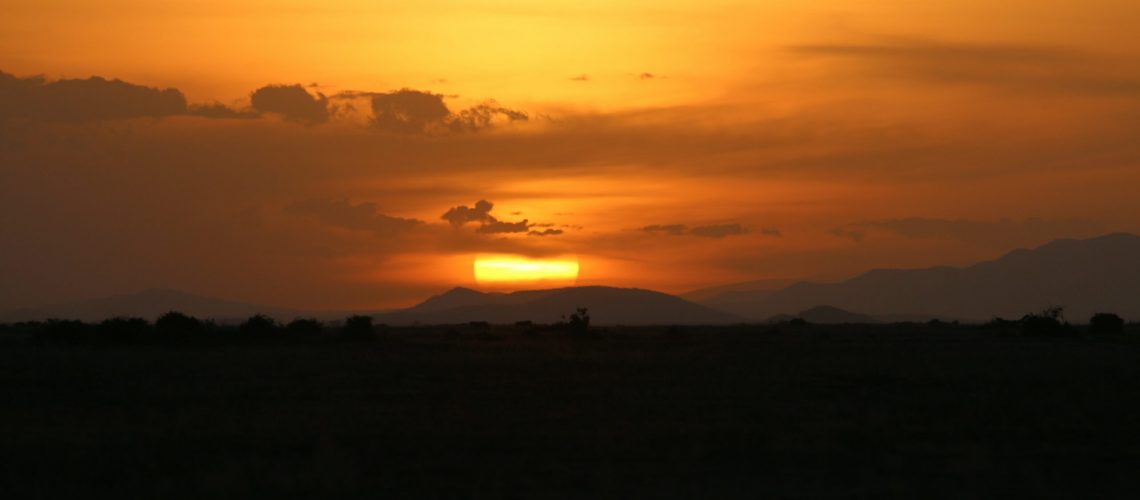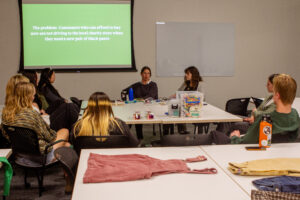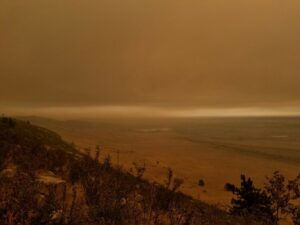By Kevin Jablonski, 2018-2019 Sustainability Leadership Fellow and Ph.D. Student in the Department of Forest and Rangeland Ecology
I study the ecology of livestock grazing management, and the questions I ask take me to interesting places. In January, I found myself sitting across from a 102-year-old Maasai elder outside his home in a remote part of southern Kenya, chatting over tea about the cultural changes he had witnessed in his life. Translating beside me was Luke Maamai, a senior staff member of Lion Guardians, with whom I am collaborating on a project aimed at better understanding the relationship of livestock management to conflict with lions.
Across a two-hour conversation, this respected man generously shared his knowledge of herding best practices, wildlife population trends, and youth mentorship as I scribbled away in my notebook. What excited him most, though, was describing to me how the spatial positioning of three stars on the eastern horizon just before dawn predicts whether good or bad times may be coming. I listened carefully and with interest but, as we were wrapping up, he looked at me intently and asked, “Why didn’t you take notes when I was describing the stars?”
Throughout my doctoral studies, I have been troubled by a fundamental question— how do we determine which knowledge matters, and who gets to decide? The answers that I have come to have upended my view of the work that I do and cut to the heart of the growing divide between “science” and “the public”.
In high school we all learned that science is a rigid process wherein predictions are tested through careful experimental observation, ideally in a highly controlled setting— the scientific method. By subjecting our findings to an intensive process of analysis, criticism, and verification, we incrementally advance human understanding of the world. Many good people holding this view of science have made tremendous contributions to human knowledge and wellbeing.
Sometimes, however, the argument is made that this method is not just one effective way to generate knowledge, but the only way. This is when science moves from mode of inquiry to dogma, one that Wendell Berry has likened to “modern superstition”. This dogma has been used repeatedly to justify, by tautology, the destruction of belief systems that have helped people persevere for thousands of years in difficult environments. When we speak of science’s contributions, we must also acknowledge this failing. Despite my best intentions, I was guilty of this in filtering the Maasai elder’s wisdom through my cultural lens, as manifested in my notebook.
There is another view of science, one that has been held by scientists from Isaac Newton to Richard Feynman to Steven Hawking. This view of science, in the words of the philosopher Paul Feyerabend, holds that “science is essentially an anarchic exercise”. The only thing that ultimately matters is how useful our explanations are, and how we arrive at these is unimportant. Uncertainty is fundamental. As Feynman wrote, “To make progress in understanding, we must remain modest and allow that we do not know.” This humility enables us to be more expansive, inclusive, and imaginative.
I believe that it is this anarchic, humble approach to science that holds the key to addressing our most imposing question— how can we humans live on our only home without ruining it? For example, while rigid science has frequently denigrated indigenous ways of knowing, anarchic science can recognize that they often excel at explanations that involve high complexity and large spans of time and space, areas where rigid science has often failed. As noted by Feyerabend, “Today old traditions are being revived and people try again to adapt their lives to the ideas of their ancestors…[S]cience, properly understood, has no argument against such a procedure.” For my own work, I have taken the Maasai elder’s question to heart to see that the stars may in fact have a role to play in lion conservation.
As communities, as nations, as a species, we face tremendous existential challenges. No matter how broadly defined, science cannot address these challenges alone. Instead, we need knowledge, spirit, love, and propriety in equal measure. To the extent that science has silenced these other aspects of our humanity, it has failed us. We can do better. After all, as Wendell Berry writes in “Life is a Miracle”, the “wholeness of creatures and places together is never going to be apparent to an intelligence coldly determined to be empirical or objective. It shows itself to affection and familiarity.”






